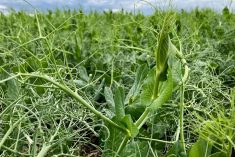REGINA — Barring any major yield-altering events between now and harvest, western Canadian yields for spring wheat and canola will be lower than last year’s bin busting numbers but better than average.
That was the main conclusion following a prairie-wide crop tour that began earlier this week and concluded today in Regina.
The four-day tour of Western Canada’s key grain producing regions estimated average spring wheat yields at 43 bushels per acre, canola at 34 and durum at 48.
“We’re not trying to produce a number that is the final end-all, be –all of the Canadian crop,” said CWB crop analyst and tour organizer Bruce Burnett.
Read Also

China to buy 12 million metric tons of soybeans this season, Bessent says
U.S. Treasury Secretary Scott Bessent said on Thursday that China has agreed to buy 12 million metric tons of American soybeans during the current season through January and has committed to buying 25 million tons annually for the next three years as part of a larger trade agreement with Beijing.
“This is like a snapshot. We’re going around the Prairies. We’re taking a look, we’re taking stock. Two days from now there could be a massive freeze and everything could change just like that.
“But for here and for now, this is kind of what we’re looking at. The yields that we present are going to be an indication of what the potential is … (but things) are still a long ways from being in the bin.”
The crop tour was organized by CWB and examined potential crop yields in hundreds of crops along a route that covered thousands of kilometres in Manitoba, Saskatchewan and Alberta.
For logistical reasons, the only major grain growing area that was not included in the tour was the Peace River district in northwestern Alberta and northeastern British Columbia
Burnett said later-than-normal crop staging in many areas made it difficult to accurately estimate yields in some crops.
Crop staging for spring wheat is as much as one or two weeks behind in the eastern Prairies.
In much of Alberta, crop staging is only slightly behind normal.
Flooding has taken a significant chunk of farmland out of production in eastern Saskatchewan and western Manitoba.
Burnett estimated that unseeded acres and seeded acres lost to flooding will account for 3.5 to four million acres of lost production this year.
Excess moisture will also reduce yields in many areas.
In general, western Canadian crops show “solid” yield potential, though lower than 2013.
Warm, dry weather over the next few weeks will reduce the risk of frost damage and could result in slightly elevated protein levels compared to 2013.
Burnett’s figures were shared against a gloomy backdrop that suggested world markets are awash in grains and oilseeds.
Daniel Basse, market analyst president of the U.S.-based AgResource Company, said worldwide plantings of corn, soybeans and wheat hit a record level in 2014.
U.S. analysts are forecasting record production in the United States.
Russian wheat production, estimated by the U.S. Department of Agriculture at 53 million tonnes, could come in closer to 60 million tonnes, according to many analysts.
In China, corn production is also expanding rapidly, said analyst Quiang Li from JCIChina in Shanghai.
Overall, increased production in North America and expanding world stocks of coarse grains will continue to weigh heavily on wheat prices, barring a major production problem.
Demand for rail capacity from North America’s energy sector could also translate into high basis levels again this year, a prospect that won’t sit well with many western Canadian farmers who paid a huge price to move last year’s record breaking Canadian harvest.
In terms of price, one of the few bright spots for western Canadian producers is the potentially positive outlook for high-protein wheat.
Demand for high-protein wheat is likely to result in more visible protein premiums this year.
In China, demand for foreign oilseeds is likely to remain at current levels or increase, added Li.
Chinese production subsidies favour the production of corn at the expense of oilseed crops such as rapeseed and soy.
Subsidies supporting corn production in China are not likely to change within the next two to three years, Li said.















